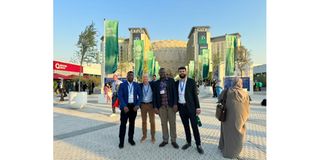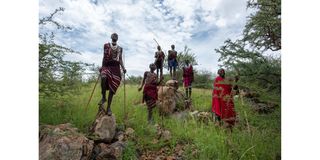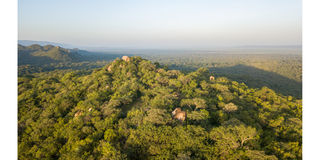Tanzania's Carbon Investment Landscape and Its Journey towards Sustainability

Azaria Kilimba, Marc Baker, Alphael Jackson, David Beroff at COP28 in Dubai
Tanzania is currently on a transformative journey towards sustainable development, spearheaded by groundbreaking initiatives in the carbon market. A pivotal player in this narrative is Carbon Tanzania, an organization that has been at the forefront of nature-based solutions since its establishment in 2011. Operating under a 30-year contract with local community partners and in partnership with the National Carbon Monitoring Centre (NCMC), Carbon Tanzania's vision extends beyond economic gains, aspiring to create a future where environmental preservation and economic prosperity are mutually reinforcing.
One of Carbon Tanzania's remarkable achievements lies in its extensive projects covering 16,700Km2 of community managed land with the aim to establish projects across six national parks, constituting an impressive 1.8 million hectares. However, the impact of Carbon Tanzania extends to Kiteto District, Manyara Region, where the Makame Savannah project, managed by the community Wildlife Management Association (WMA) has become a beacon of sustainable income for over 26,000 villagers. This income has supported livelihoods, allowed the Masai to continue to practise their traditional lifestyle in harmony with nature and fortified essential services such as health, water supply, and education, exemplifying the organization's commitment to holistic sustainability.
Carbon Tanzania's biggest achievements include the ability to replicate their model across different landscapes with diverse communities and selling resulting credits on the voluntary carbon market. This introduces a new and reliable revenue stream to their community partners. Importantly, this enables the direct channeling of finance from the global north to communities in Tanzania, a significant achievement considering that Indigenous peoples receive less than 1% of climate finance, as reported by the Rainforest Foundation Norway.

Communities of Yaeda-Eyasi Landscape project and Makame Savannah Project receive a cheque for Sh4.7 billion
Carbon Tanzania's collaborative synergy can be recently seen through a Memorandum of Understanding (MoU) for a feasibility study with six Tanzania National Parks (TANAPA), collaborations with local communities, village and district governments to emphasize the importance of working together to achieve both environmental and economic goals.
This collaborative spirit also aligns with President Samia Suluhu's recent call for a united stance within the East African Community (EAC) against foreign dominance in the carbon trading business. The organization actively navigates regulatory landscapes, ensuring compliance with both national and international standards. This proactive approach not only enhances the credibility of its projects but also creates a favorable environment for investors seeking stability and adherence to ethical practices.
What further sets Carbon Tanzania apart is its commitment to delivering high-quality carbon credits. Engaging certification standards such as Verra, Plan Vivo ensures that its projects meet rigorous international standards, which ultimately also contributes to global environmental objectives, positioning Carbon Tanzania as a reliable and credible partner for investors prioritizing impactful and sustainable ventures.
The strategic position of Carbon Tanzania within Tanzania's voluntary carbon market aligns with the growing global demand for carbon credits. Its track record of success, community-led projects, and commitment to high-quality standards make it an appealing option for investors seeking financial returns intertwined with positive environmental and social impact.

Datooga pastoralists protecting their community owned forests in Eyasi Region
According to the Global Carbon Business Investment Report for 2023 by Trove Research, the investment in projects between 2012 and 2022 reached a staggering $36 billion, with half of the investment made in the last three years. Carbon Tanzania contributes to this landscape, attracting investors recognizing the potential for financial returns and environmental stewardship.
In addition to carbon credits, the emerging global biodiversity market provides Tanzania with diverse opportunities within the nature-based solutions spectrum to channel finance to frontline communities protecting biodiversity. Beyond carbon credits, investments in biodiversity contribute to ecosystem resilience, a crucial factor in mitigating the impacts of climate change. Biodiversity credits, a potential cornerstone of Tanzania's evolving nature-based solutions landscape, represent a key shift in environmental conservation and sustainable development. These credits go beyond traditional carbon-focused initiatives, recognizing the intrinsic value of diverse ecosystems.

Forested valley's of the Yaeda-Eyasi Landscape project
Biodiversity credits, a framework designed to include the economic value of biodiversity in global markets, operate as a measurable, validated, and verified unit. This digital representation reflects the avoided loss of, or increase in, an area's biodiversity. Numerous standards are emerging to define and set protocols for the standardization and measurement of biodiversity worldwide, enhancing the credibility and effectiveness of such initiatives.
At COP28, Azaria Kilimba, the Operations Manager at Carbon Tanzania, emphasized the value of biodiversity and nature. While acknowledging the significance of carbon credits, he advocated for a broader perspective on biodiversity credits, he emphasized "These credits should encompass a deeper understanding of on-ground situations, incorporating the local community's role in building the true value of nature. In this evolving landscape, the distinction between carbon and biodiversity credits becomes secondary to their shared goal of generating equitable finance for local communities, thereby safeguarding and realizing the true value of the protected environment."
As Tanzania positions itself as a key player in the global carbon market, Carbon Tanzania stands as a testament to the possibilities that arise when commitment, collaboration, and conscientious investments converge for the greater good. In navigating regulatory challenges and embracing emerging markets, Tanzania paves the way for a future where nature's wealth becomes a source of sustainable prosperity for all. As the world collectively moves towards a nature-positive future, Tanzania's strides in both carbon and biodiversity markets position it as a key player in the global effort to harmonize economic development with environmental stewardship.



